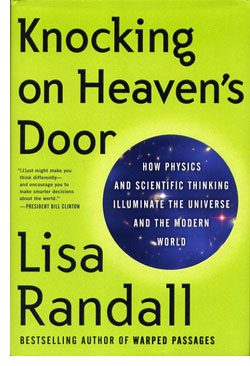 |
 Lisa Randall
Lisa Randall
Knocking on Heaven's Door: How Physics and Scientific Thinking Illuminate the Universe and the Modern World
Reviewed by: Rick Kleffel © 2011
Ecco / HarperCollins
US Hardcover First Edition
ISBN 978-0-061-72372-8
Publication Date: 09-20-2011
442 Pages; $29.99
Date Reviewed: 10-09-2011
Index:
Non-Fiction
The universe is real. Drop a rock, and it's going to fall on the ground. That's gravity at work, a weak force, particle physicist Lisa Randall tells us, but real. We can measure how fast things fall. We can know the world around us by virtue of our ability to measure it, and observe the universe across a spectrum of scales that is no less than breathtaking.
Randall's new book, 'Knocking on Heaven's Door: How Physics and Scientific Thinking Illuminate the Universe and the Modern World' is more than a bit breathtaking itself. Randall is well known for 'Warped Passages: Unraveling the Mysteries of the Universe's Hidden Dimensions,' her lucid and excitingly written exploration of the state of physics in the dawn of the 21st century. In the six years since she wrote that book, plenty has come to pass in the world of particle physics, particularly with the completion of the Large Hadron Collider.
But Randall lives in our world, and that's what makes her new book so compelling. With 'Knocking on Heaven's Door' she steps outside of the lab to look at the role and perceptions of science in world society at large, even as she reveals the awesome and potentially terrifying power what we're able to learn now. The interplay of science, art, politics and religion are vitally important not simply to physics, but to our ability to know the world. Only if we have a grasp of actual reality will we be able to make the difficult decisions that face us at this (or any) moment in history. 'Knocking on Heaven's Door' is an impassioned call to reason and reality.
Readers expecting an immediate immersion in mind-numbing technology and physics are best advised to look elsewhere. Randall begins her book by going back to the basics, to explain how and why science works to an audience that has been overwhelmed with details of science's progress recast as shortcomings. She traces our current ambivalence back to Galileo's travails, and does a fine job of showing how while many attitudes have helped open up the way for science, there is still potential for needless conflict.
Simultaneously, Randall begins her exploration of the latest discoveries in physics by taking readers down, then up the scales of measurement, showing how new technologies have enabled new visions of the world. She's very careful and expert demonstrating that new discoveries do not necessarily render old ones obsolete or prove them false. The same lucidity she brought to the Standard Model of physics in 'Warped Passages' is here applied to risk assessment and the role of science in steering the world. If we are to make good decisions, she argues, we must make them in the light of clearly understanding the physical world.
The physical world, down to particles beyond many readers' ken before they read this book, is Randall's forte, as is describing the latest discoveries and how they might impact civilization. The author is clearly enamored of the Large Hadron Collider and its potential for helping us plumb the most inner workings of the universe. The upshot for the reader is a very entertaining and comprehensible history of this astonishing piece of technology. Perhaps the most notable aspect is that, even though there are clearly some competitive minds and nations at work here, the overall feel is of international cooperation to achieve the larger goals in the interest of humanity. It's like a scientific version of the UN, with most of the bickering but little of the vitriol.
|
|
|
Back cover, Large Hadron Collider, Front cover, The unviverse |
Randall does not stop with the technology and readers are definitely going to get a mind full of particle physics, gently administered in clear prose, reasoned arguments and smart analogies. The book's design plays a significant part in the process. The dust jacket and front cover interplay are quite nice. The interior illustrations bring to life Randall's visionary explorations. Randall offers enough details to inspire a couple of generations of science fiction writers in a manner that lets more general readers get the gist of the arguments without being beamed into the aether on wide dispersion. Chances are you'll come out of this book with your head spinning, but the effect will be enlightening.
'Knocking on Heaven's Door' is not simply another tome about quark, strangeness and charm. You'll find plenty of all three of these qualities in all their definitions, but you'll also come away heartened that those at the forefront of human thought and human civilization are well aware of how their work impacts us all, on a day-to-day basis. Randall's an excellent prose stylist, who employs this talent to help readers comprehend the cutting edge at an appropriate level of detail. She writes a lot about scale in this book, and it clearly informs her writing.
Most importantly, readers will understand how their own impressions of what is happening impact the science itself. Science is civilization's best tool for bettering the lot of those who are not scientists. Its ability to do so hinges on their willingness, our willingness to accept that while reality does not change, our understanding of it does. The self-improvement that characterizes science is not a weakness, but rather its greatest strength.
|
 |




